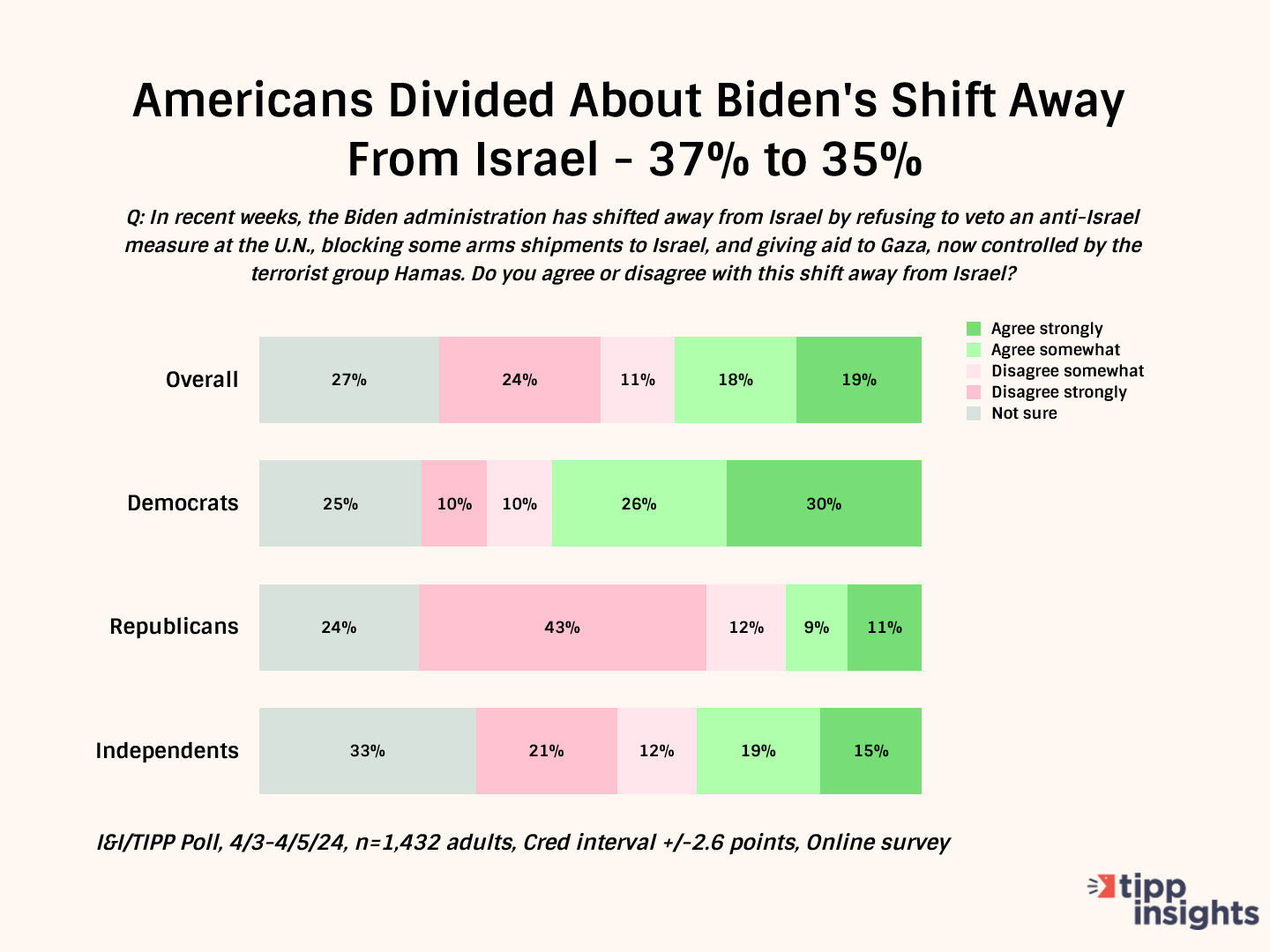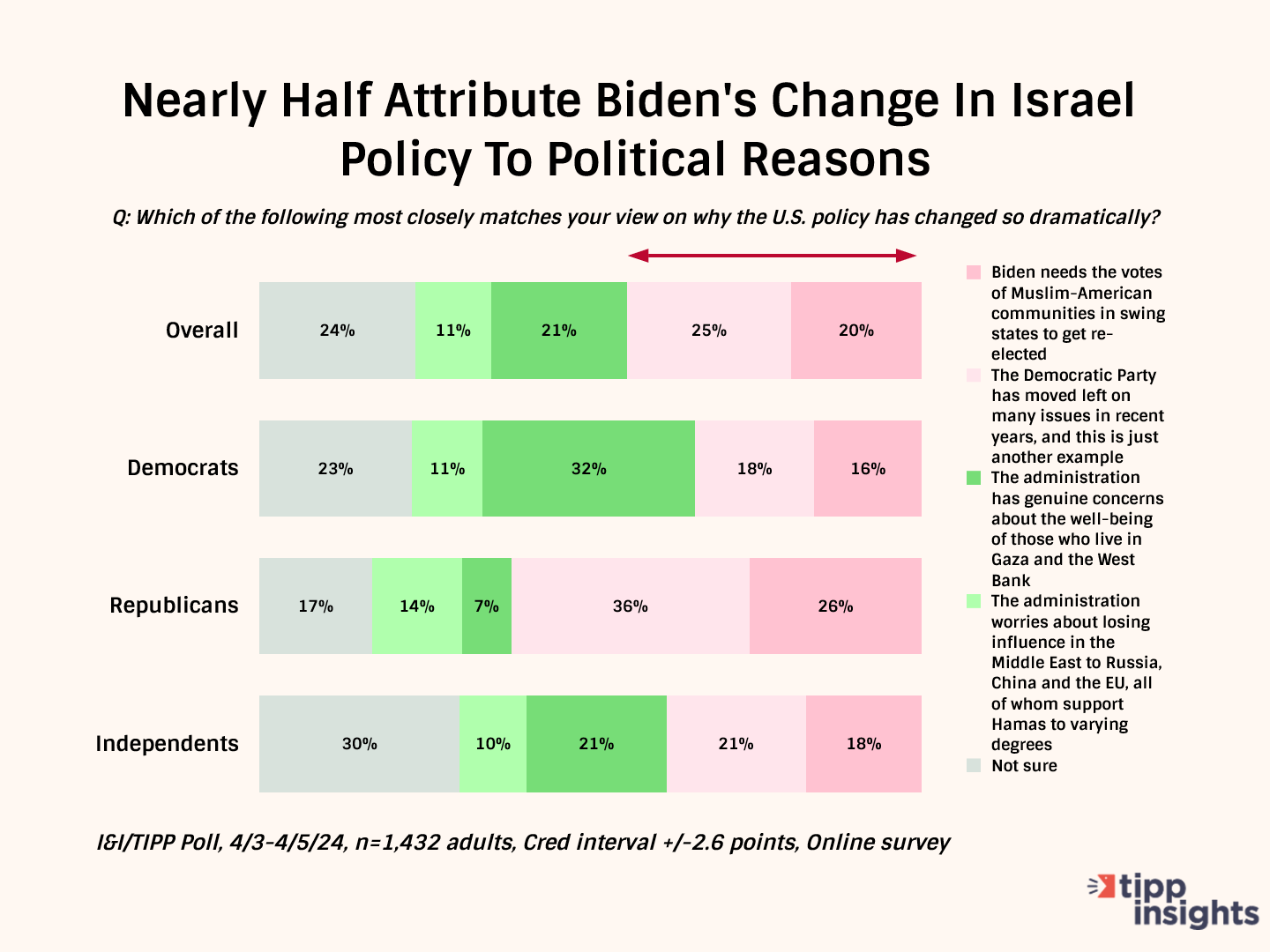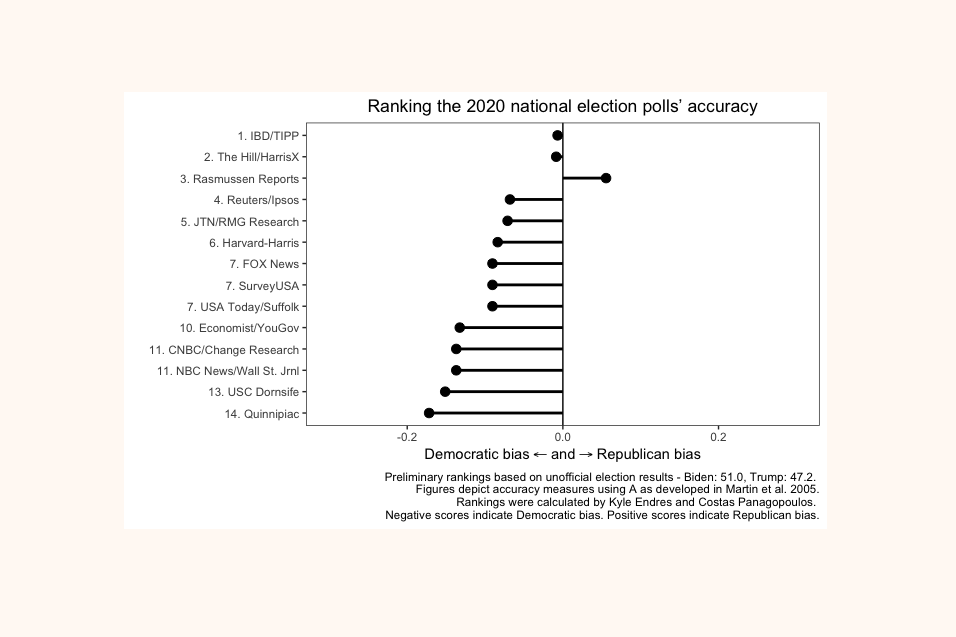In recent weeks, the Biden administration has distanced itself and U.S. policy from Israel’s response to attacks from Hamas and Iran, two of Israel’s bitterest enemies. Americans show sharp political divisions in their support of Joe Biden’s policy shift toward the U.S.’ long-time Mideast ally.
Hardly a day goes by without more news from the Mideast, much of it related to Israel’s retaliation following Hamas’ shocking Oct. 7 invasion, resulting in at least 1,200 dead and 240 kidnapped and held as hostages in Gaza and elsewhere.
This month, after Israeli missiles killed the Iranian general who masterminded the raid, Iran launched a massive missile and drone strike against Israel. It was successfully defended by Israel and its regional allies, including the U.S. Israel followed up with an April 18 offensive of its own on key military and nuclear sites in Iran.
For this month’s nationwide online I&I/TIPP Poll of 1,432 voters taken from April 3-5, we asked Americans about the cooling of formerly warm ties between the U.S. and Israel:
In recent weeks, the Biden administration has shifted away from Israel by refusing to veto an anti-Israel measure at the U.N., blocking some arms shipments to Israel, and giving aid to Gaza, now controlled by the terrorist group Hamas. Do you agree or disagree with this shift away from Israel?
Those who answered the poll, with a margin of error, were given five possible responses: “agree strongly,” “agree somewhat,” “disagree somewhat,” “agree somewhat,” and “not sure.”
Americans are split almost equally between “agree” (37%) and “disagree” (35%). Broken down further, 19% said they “agree strongly,” while 18% said they “agree somewhat” with Biden’s shift away from supporting Israel. Among those on other side of the issue, “11%” said they disagreed “somewhat,” while 24% said they disagreed “strongly.”
A hefty 27% said they were not sure.
A closer look at the data shows that the split is primarily a political one, with Republicans (55% “disagree,” 20% “agree”) a bastion of support for Israel when compared to Democrats (56% “agree,” 20% “disagree”) and independents (33% “disagree,” 34% “agree”).

We followed up with a second question, trying to get at the reasons for the apparent shift away from Israel, asking:
“Which of the following most closely matches your view on why the U.S. policy has changed so dramatically?” The possible responses, along with the percentages selected, are below:
- Biden desperately needs the votes of Muslim-American communities in swing states to get re-elected. (20%).
- The Democratic Party has moved left on many issues in recent years, and this is just another example (25%).
- The administration has genuine concerns about the well-being of those who live in Gaza and the West Bank (21%).
- The administration worries about losing influence in the Middle East to Russia, China and the EU, all of whom support Hamas to varying degrees (11%).
- Not sure (24%).

As the data show, the answers broke pretty evenly, with the exception of number four, which got just 11%. But once again, the differences by party were strong:
Response No. 1 received 16% support from Democrats, 26% support from Republicans, and 18% support from independents.
Response No. 2 broke 18% Dems, 36% GOP, and 21% independents.
Response No. 3 won 32% of Democratic support, versus 7% of Republicans and 21% of indie voters.
Response No. 4 garnered 11% of Democrats, 14% of GOP votes, and just 7% of independent/third party supporters.
The answer from both questions suggests that there has been a major political realignment in America, with Republican voters and, to a lesser extent, independents, supporting Israel and Democrats pulling back on their former strong backing of the multiethnic, multiracial, multireligious nation of 10 million people.
But there has also been a major realignment by age groups. Those 18-24, for example, strongly support the shift away from Israel (46%), compared to 44% of those 25-44, 32% for the 45-64 year-old group, and 30% for those over 65.
Israel has a problem with young Americans, which goes a long way toward explaining the extraordinary anti-Israel and anti-Jewish demonstrations now creating discord and even violence on college and university campuses across the nation.
The horrific Oct. 7 terrorist assault by Hamas left Israelis reeling, but also set off an at-times-bitter debate over Israel among Americans. The debate has included Jewish-Americans, themselves sharply divided on supporting Israel against the Palestinians.
Decades of talks between the Israeli government and Palestinian representatives regarding a so-called two-state solution have gone mostly nowhere. Now, with chants of “From the river to the sea” (a slogan essentially signifying the end of the Jewish state) echoing at anti-Israel demonstrations across the nation, the debate has taken an ominous turn.
But will it impact the election? It may already have. Plainly, Republicans and independents are far more favorable to Israel in the current climate than Democrats.
Biden, concerned about losing the support of pro-Israel Democrats, on Saturday said he would back a $26 billion aid package for Israel, part of a larger foreign-aid bill that includes billions of dollars for Ukraine and Taiwan, as well. That move has created “heavy pushback from Muslim voters and organizations,” Fox News reported.
Biden has hemorrhaged political support from midwestern Muslim communities for not coming down hard on Israel’s campaign against Hamas terrorists.
That leads some to question: Is his support for more aid for Israel an attempt at restoring his party’s historic ties to U.S. Jewish voters? Or just part of a deal to get more money for Ukraine?
If the former, that would be a dramatic reversal from earlier this month, when Biden phoned Israeli Prime Minister Benjamin Netanyahu to express his concern that Israel’s response to the Iranian retribution might widen the war in the Mideast.
At the time, Biden administration officials were scathing in their not-for-attribution remarks on Israel: “I don’t think they had a strategy,” one senior administration official said. “The Israelis don’t always make the best strategic decisions.”
Since then, however, Israel’s military response against Iran proved to be less than what many had expected after it launched a limited airstrike, hitting an Iranian air base in Isfahan. Many on the left had expressed concern that Israel would carry out a devastating attack against multiple sites in Iran, igniting a regional war. It didn’t happen.
With the 2024 campaign in full swing, groups that back Israel have forged a $100 million push the return the Democratic Party back toward the pro-Israel side of the debate. It’s too early to tell whether it’s had much impact, if any.
Even so, big media outlets remain concerned about the possible defection of Jewish votes and financial support in the coming election. As one recent New York Times headline lamented: “How the Israel-Gaza Protests Could Hurt the Democratic Party.”
Former President Donald Trump, meanwhile, has at times been mildly critical of Israel. But his track record while in office from 2017 to early 2021 was impeccably pro-Israel.
Still, he’ll be facing an uphill battle in getting Jewish support. As the Jewish Virtual Library notes, “American Jews tend to favor Democratic candidates, with 71% of Jewish voters choosing Democratic candidates on average and 26% choosing Republicans since 1968.”
That includes 2020, when Trump got just 30% of the Jewish vote to Biden’s 68%. Will this be another formerly solid group of Democratic backers from which Trump wins support, as polls show for both Hispanics and blacks?
I&I/TIPP publishes timely, unique, and informative data each month on topics of public interest. TIPP’s reputation for polling excellence comes from being the most accurate pollster for the past five presidential elections.
Terry Jones is an editor of Issues & Insights. His four decades of journalism experience include serving as national issues editor, economics editor, and editorial page editor for Investor’s Business Daily.
Want to dig deeper? Download crosstabs from our store for a small fee!
Our performance in 2020 for accuracy as rated by Washington Post:










